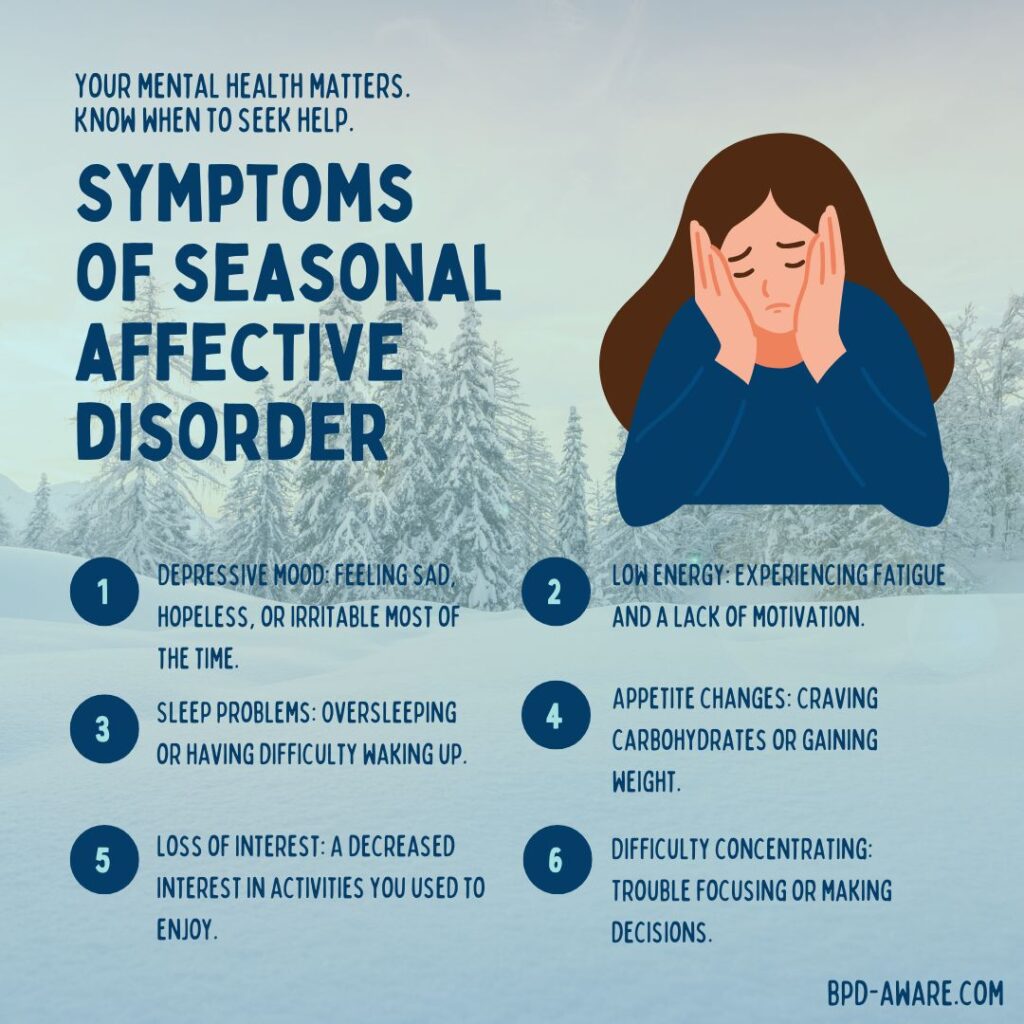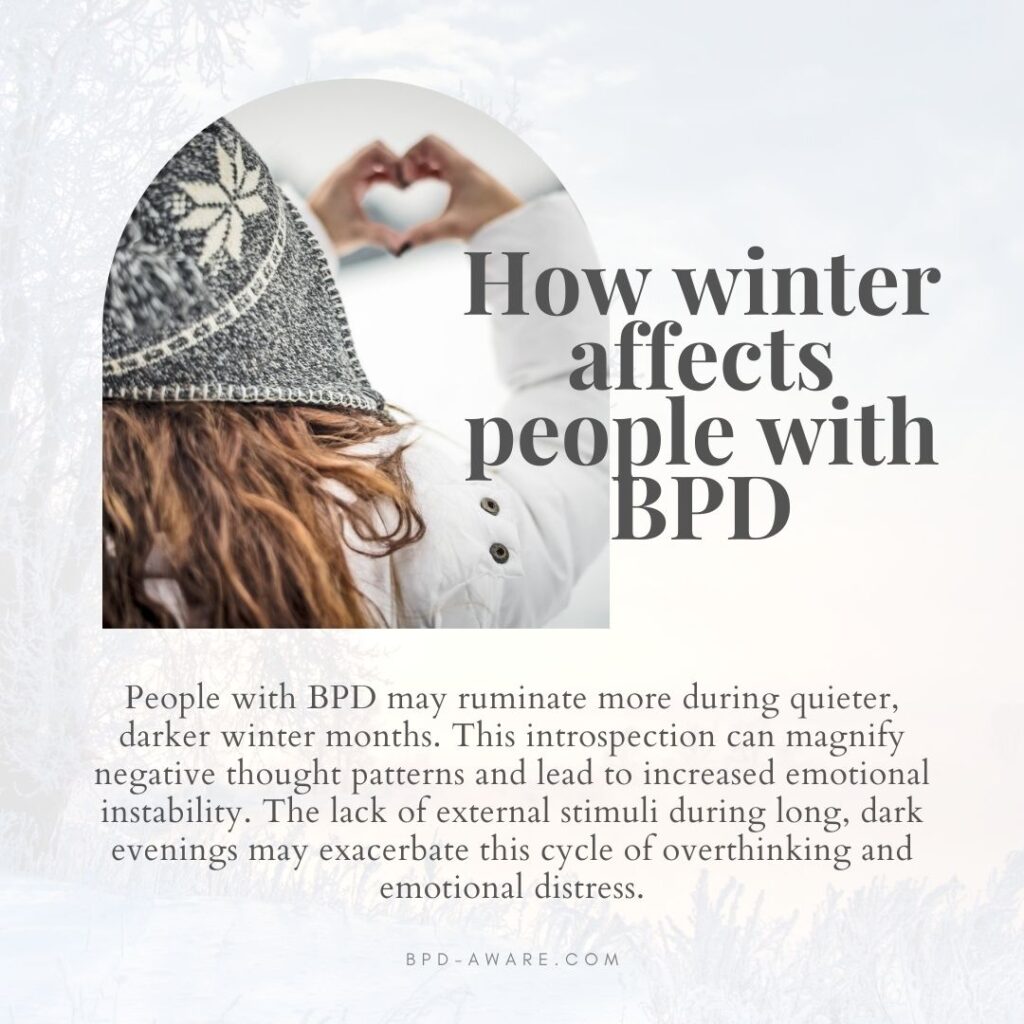Cold days and long dark nights can make winter a challenging time of year for many people, especially after the holidays have been and gone. The holidays can provide a beacon of joy for those who enjoy them. Of course, not everyone enjoys the holidays. Even for those who do enjoy the holidays, they are a light that soon burns out and leaves us facing cold, dark times for the foreseeable future.
When you live with borderline personality disorder (BPD), depression is a common co-occurring condition. What’s less talked about though is seasonal depression and how it affects people with BPD.
In this article we will look at seasonal affective disorder (SAD), how it manifests during winter, the added dangers of SAD when you have BPD, and what you can do to fight back against seasonal depression.
What Is Seasonal Affective Disorder?
Seasonal affective disorder is the proper medical term for what is more commonly known as seasonal depression. SAD affects roughly 5% of the population and is typically most prevalent during late fall and winter, although some people suffer from seasonal depression in summer.
People with SAD will report feeling sad, hopeless, or irritable during winter. They may also experience low energy levels, a lack of motivation, and sleep problems. Some people with SAD also report changes to their appetite, a loss of interest in things they previously found enjoyable, and difficulty concentrating.
The main cause of seasonal affective disorder is believed to be related to the reduction in light exposure experienced during winter. When you wake up in the dark, the skies are gray all day, and then it’s dark again by 4 PM, it can be difficult to feel your usual self. This lack of daylight results in lower levels of Vitamin D and changes in the body’s internal clock which can affect levels of serotonin and melatonin, chemicals responsible for mood and sleep.
This can make winter a miserable time of year for many people, but when you suffer from SAD and you have BPD, it can make the whole experience so much worse.

How Does Seasonable Affective Disorder Affect People With BPD?
Depression is a common co-occurring condition with BPD and it’s likely the same can be said for seasonal depression and BPD, although more research needs to be done on the matter.
Seasonal changes can have a big effect on circadian rhythms. Circadian rhythms are the natural, internal processes that regulate the body’s sleep-wake cycle, as well as other physiological functions. They play a significant role in when you feel sleepy and when you feel awake. For example, when it’s dark, your body will naturally release melatonin as it believes it’s time to go to sleep. This is fine when it doesn’t get dark until later, but in winter it can be dark for much of the day, causing a constant feeling of tiredness.
Circadian rhythms also influence body temperature, metabolism, mood, and cognitive functions.
So when you’re sensitive to the lack of daylight that winter provides, it can have a massive effect on a lot of functions that impact your energy levels and mood.
People with BPD tend to be more sensitive in general – and seasonal changes are no different. When you have these changes happening to your circadian rhythms in winter and you have BPD, it can create a “perfect storm” that makes everything about having borderline personality disorder so much worse. All those nasty symptoms of BPD are much more easily triggered when you’re also dealing with changes to your sleep patterns, energy levels, and mood.
There is also the social aspect of winter, which is sometimes overlooked in seasonal depression. People tend to naturally want to stay indoors more during winter and may socialize less as a result. There is often a huge glut of socializing around the holidays and then it all dies down in January, February, and March until the weather begins to brighten again. This can be tough for the BPD brain to cope with as it can feel an awful lot like rejection – something that’s a huge trigger for people with BPD – when the reality is that many people are just tired and need to rest more during winter.
This is all made worse by the fact that it’s entirely possible to experience seasonal depression on top of regular depression…all on top of BPD and any other co-occurring conditions someone might suffer from. This is a lot to bear and can be overwhelming. It’s no wonder that some people with BPD struggle through winter.

Strategies To Overcome Seasonal Affective Disorder For People With BPD
Now that we understand more about seasonal affective disorder and how it can make the symptoms of BPD worse, it’s time to look at some strategies to ease the worst that winter can throw at us.
If you’re someone who has struggled with SAD in the past, one of the important things to do is accept that you may need to change your lifestyle to make it through the winter months. You don’t need to make massive changes, but there are a few things you can do to help yourself.
Maximizing Exposure To Natural Light
Do everything you can in your power to make sure you’re awake during the daylight hours. It can be easy to just doze in bed all day, especially during the weekend, but this will only make your depression worse. Take in all the natural light you can during the day. Get outside and go for a walk, even if you have to wrap up in four layers just to stay warm!
Just hours ago, as of writing, I went out for a walk in 7F/-14C-degree weather during lunch, just to make sure I could experience as much natural light as possible. And I felt so much better for it once I got back inside and had a nice warm drink. A walk can really energize you, even if it is seriously cold.
Of course, it’s not always possible to go outside in winter if the weather is really nasty or work is particularly busy. If that’s the case, try and sit next to a window that lets in as much natural light as possible. It’s not as good for you as actually being outside but it’s better than nothing and at least you’ll be warmer!
Finally, you may want to consider purchasing a light therapy lamp. Light therapy lamps produce light that mimics natural sunlight. Typically these should be used during the day and for anywhere between 30 minutes to 3 hours. They work well for many people and provide a much-needed boost to energy and mood.
Focusing On Exercise And Diet
Winter can easily become an excuse to not exercise and eat poorly. It feels too cold to exercise outside – and there may be some legitimacy to that. Cold weather can create icy conditions that are dangerous to walk or run in, and cold dry air can irritate the lungs. However, even when the weather outside is frightful, there are still things you can do to get regular exercise.
Create an indoor training plan for yourself. This can be done at home or in a gym if you have a membership. Winter can be a time to focus on weightlifting, yoga, circuit training, spin classes, calisthenics, and all other manner of activities.
I live in a part of the US that gets hit hard by winter to the point where it’s often not safe to exercise outside. I still try and get out to run when I can but I will often spend the season focusing more on strength training and improving my flexibility. My cardio takes a hit but I get stronger in other areas, so it balances out. It also gives me a mental break from the grind of running 5 or 6 times a week.
Eating a balanced diet that’s rich in foods that contain Vitamin D, can also be very helpful. Humans get much of their Vitamin D from sunlight, which is in short supply in winter. Vitamin D is an important nutrient as it supports immune health, muscle function, and brain cell activity. Vitamin D-rich foods include eggs, fish, liver, yogurt, fortified cereal, fortified orange juice, and mushrooms. Many people become Vitamin D deficient in winter, so a change in diet and supplementation can be of benefit.
Other supplements can also help people with BPD, which we discuss in the article below:
The Best Supplements To Take When You Have BPD
Staying Socially Connected
Many people, not just those with SAD or BPD, feel less energized in winter. This often means that most people just want to stay at home after work or over the weekend, and socializing drops off until the weather improves.
However, humans are social creatures and socializing is proven to have a tremendous impact on mood. That’s why it’s important to socialize as often as possible, even when you don’t feel like it.
If you don’t have a wide social circle, or find it hard to get other people to socialize in winter, you might consider seeking an online support group. Online support groups, especially those focused on SAD or BPD, will have people going through similar problems with whom you can share your experiences.
Leaning Into Winter
One thing that can help improve your mood and reduce symptoms of BPD in winter is to accept the season for what it is and to lean into it. That means focusing on the positives of the season rather than the negatives.
For example, in winter I like to buy myself a selection of winter-themed herbal teas. These help to keep me warm and cozy while engaging in the spirit of the season. Likewise, my diet may change to include more home-cooked soups, stews, and other warming recipes.
Winter can be seen as a time to slow down and focus more on your internal experience. Spending your evenings underneath a warm blanket while watching one of your favorite shows is a perfectly valid way to spend a winter’s evening.
Therapy And Professional Support
If winter is overwhelming you, you may want to seek support from a mental health professional. Therapy can help you through your darkest moments and teach you skills that will help you survive today so you can thrive tomorrow.
Therapy can be expensive, but online therapy is often more affordable than in-person options. Right now, Online-Therapy.com is offering a 20% discount to our readers when they use the promo code Therapy20.
Final Thoughts
Winter is a challenging time of the year for many, particularly those who are already struggling with BPD. The lack of sunlight can play havoc with many of the systems responsible for keeping us both physically and mentally healthy.
Seasonal depression, aka seasonal affective disorder, brings its own challenges and can make symptoms of BPD even worse than usual. Difficulties with emotional regulation in particular can surface during the winter months.
However, by taking a proactive approach, there are things you can do to lessen the negative effects of winter. By committing to getting as much natural light as possible, supplementing this natural light with Vitamin D tablets and a light therapy lamp, focusing on getting regular exercise and a well-balanced diet, staying socially connected, appreciating the positives of winter, and getting professional help when you need it, you can overcome any challenge that seasonal depression throws at you.
Sources, Resources, and Further Reading
- Shedding Light on Seasonal Sadness: https://newsinhealth.nih.gov/2013/01/beat-winter-blues
- 10 Cool Ways to Beat the Winter Blues: https://ctrinstitute.com/blog/10-cool-ways-beat-winter-blues/
- Depression and borderline personality disorder: https://www.mja.com.au/journal/2013/199/6/depression-and-borderline-personality-disorder
- BPD and Seasonal Depression?: https://www.reddit.com/r/BPD/comments/10v41u2/bpd_and_seasonal_depression/
















